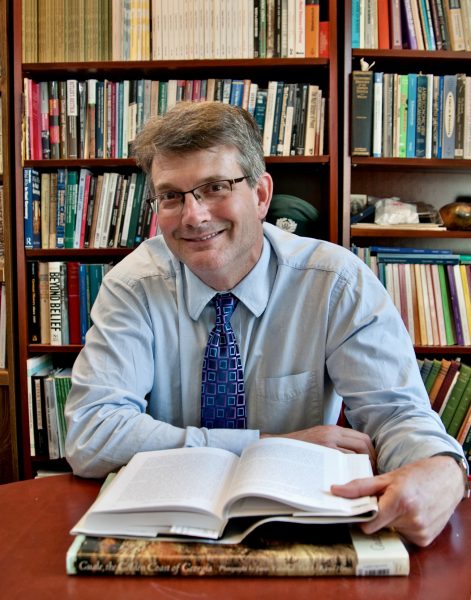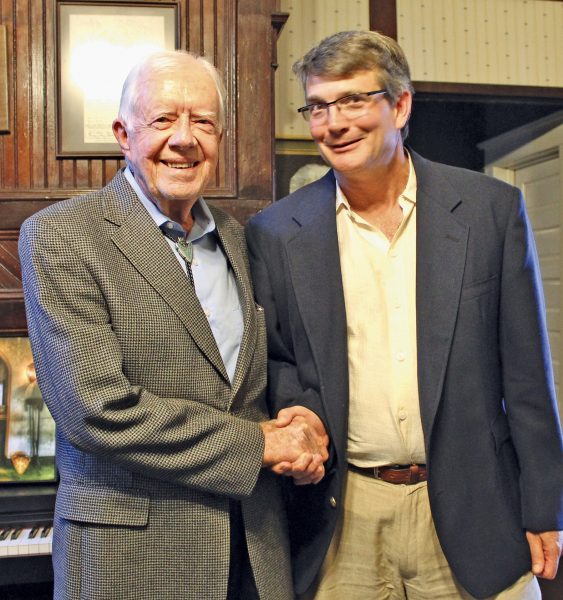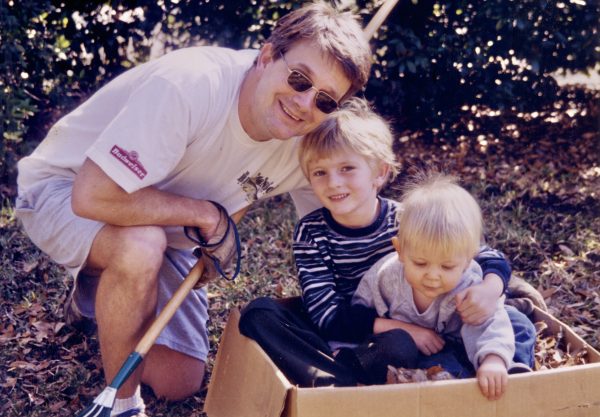The Mark Finlay and Kelly Applegate Scholarship is available to undergraduate students with a History major in the Department of History, College of Liberal Arts and Sciences. Recipients shall have demonstrated financial need and a minimum cumulative high school grade point average of 3.5 on a 4.0 scale (incoming freshman) or a minimum cumulative college GPA of 3.0 on a 4.0 scale (transfer or current student). This award shall be made available to undergraduates, including first-year students.
The Mark Finlay and Kelly Applegate Scholarship Fund honors Prof. Mark Finlay’s passion for learning. Donations can be made HERE.
About Dr. Finlay:
Dr. Mark Russell Finlay was born on September 15, 1960, in Baltimore, Maryland. He was the son of nuclear physicist Dr. Roger W. Finlay and registered nurse (RN) Dee Ann Finlay. He received his B.A. in History in 1982 from Grinnell College. Working under Dr. Alan Marcus at Iowa State University, Finlay earned his M.A. in 1988 and Ph.D. in 1992, specializing in German agricultural history.
After short teaching stints at Drake University; the University of North Carolina, Charlotte; and Johnson C. Smith University, an HBCU also in Charlotte, Dr. Finlay joined the faculty at Armstrong Atlantic State University (AASU) in Savannah, Georgia, as Assistant Professor of History in 1992. There, he founded the University’s Honors Program in 1996 and served as its director until 2004. He was promoted to Associate Professor in 1998, to Professor in 2005, and became Assistant Dean of the College in 2002. Among his awards were the AASU Alumni Award for Distinguished Faculty Service to the Academic Discipline and the highly competitive Georgia Board of Regents’ Teaching Excellence Award.
His many publications, grants, and awards provide ample evidence of Dr. Finlay’s extraordinary scholarship. His first book, Science, Practice and Politics: German Agricultural Experiment Stations in the Nineteenth Century (Iowa State University Press, 1992), was followed by Growing American Rubber: Strategic Plants and the Politics of National Security (Rutgers University Press, 2009), which was awarded the prestigious Theodore Saloutos Memorial Prize for best book published in the field of agricultural history. Dr. Finlay’s agricultural research interests stretched to bat guano, loblolly pines, sugar beets, tractors, and rubber, and he published several articles on those topics as well as German and American agricultural history, business history, Thomas Edison, research efforts at Manzanar internment camp during World War II, chemurgy and chemistry, and the Central of Georgia Railway.
Dr. Finlay was a member of several historical associations, including the Society for the History of Technology (SHOT), the American Society for Environmental History, and the History of Science Society. At the time of his death, he was serving as Book Review Editor for the Agricultural History Society, as an advisory editor of the German Agricultural Society’s Zeitschrift für Agrarge-schichte und Agrarsoziologie, and was finishing a history of Ossabaw Island for which he had interviewed former President Jimmy Carter.
Dr. Finlay’s interests were as wide as his research subjects. He loved music, from blues to indie rock to Gregorian chants. He collected political buttons and bizarre liquors from around the world, and was photographed picking local produce in more than thirty countries to which he and his wife traveled. He could be seen in downtown music clubs, at tennis courts throughout the southeast watching his sons compete, and at most local lectures. He was a member of his college golf team and held the course record at the Grinnell Country Club for many years. A life-long cyclist, Finlay twice biked across Iowa. He celebrated his thirtieth birthday by cycling one hundred miles up Grandfather Mountain in North Carolina. A true scholar, his goal in life was simply to learn everything.
Dr. Finlay died in a car accident at age 53. He is survived by his wife of 26 years, Kelly Applegate, and their two sons, Greyson and Ellis.


